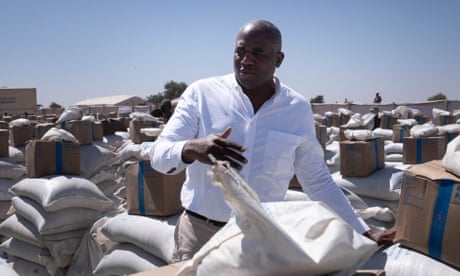Nearly half a billion dollars of food aid is at risk of spoilage following the decision of Donald Trump and Elon Musk’s “Doge” agency to make cuts to USAid, according to an inspector general (IG) report released on Monday.
Following staff reductions and funding freezes, the US agency responsible for providing humanitarian assistance across the world – including food, water, shelter and emergency healthcare – is struggling to function.
“Recent widespread staffing reductions across the agency … coupled with uncertainty about the scope of foreign assistance waivers and permissible communications with implementers, has degraded USAid’s ability to distribute and safeguard taxpayer-funded humanitarian assistance,” the report said.
According to USAid staff, this uncertainty put more than $489m of food assistance at ports, in transit, and in warehouses at risk of spoilage, unanticipated storage needs, and diversion.
USAid employs about 10,000 staff, with approximately two-thirds posted at the agency’s more than 60 missions overseas across multiple countries. The entire staff was put on administrative leave on Saturday, with limited exceptions.

The decision has caused chaos and devastation for those receiving foreign aid, such as in Malawi, one of the world’s most aid-dependent states.
The sweeping freeze on foreign assistance has also made it more difficult to track potential misuse of US taxpayer-funded humanitarian assistance, according to the report.
“While the USAid OIG [office of inspector general] has previously identified gaps in the scope of partner vetting, 10 USAid staff have reported that the counter-terrorism vetting unit supporting humanitarian assistance programming has in recent days been told not to report to work (because staff have been furloughed or placed on administrative leave) and thus cannot conduct any partner vetting,” the report said.
The agency requires that programs in Afghanistan, Iraq, Lebanon, Pakistan, Yemen, Syria, the West Bank and Gaza be vetted to ensure safe usage of US taxpayer funds. However, a lack of workers to vet the programs could lead to funding unintentionally being funneled into terrorist groups, according to the report.
Why you can rely on the Guardian not to bow to Trump – or anyone
I hope you appreciated this article. Before you move on, I wanted to ask whether you could support the Guardian’s journalism as we begin to cover the second Trump administration.
As Trump himself observed: “The first term, everybody was fighting me. In this term, everybody wants to be my friend.”
He’s not entirely wrong. All around us, media organizations have begun to capitulate. First, two news outlets pulled election endorsements at the behest of their billionaire owners. Next, prominent reporters bent the knee at Mar-a-Lago. And then a major network – ABC News – rolled over in response to Trump’s legal challenges and agreed to a $16m million settlement in his favor.
The Guardian is clear: we have no interest in being Donald Trump’s – or any politician’s – friend. Our allegiance as independent journalists is not to those in power but to the public. Whatever happens in the coming months and years, you can rely on the Guardian never to bow down to power, nor back down from truth.
How are we able to stand firm in the face of intimidation and threats? As journalists say: follow the money. The Guardian has neither a self-interested billionaire owner nor profit-seeking corporate henchmen pressuring us to appease the rich and powerful. We are funded by our readers and owned by the Scott Trust – whose only financial obligation is to preserve our journalistic mission in perpetuity.
What’s more, we make our fearless, fiercely independent journalism free to all, with no paywall – so that everyone in the US can have access to responsible, fact-based news.
 Afghanistan Peace Campaign
Afghanistan Peace Campaign